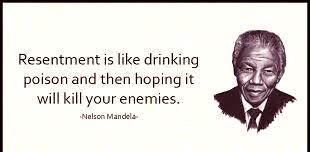Resentment is a pushing-away feeling to me, a feeling of indignation, of being wronged, about some situation or at some person. I’ve seen several people complain and express resentment about the unusually cold snowy weather we’ve had in the northeast USA lately. They’ll say “I moved south just to get away from this!”, acting as if the winter weather was an insult directed specifically at them, a personal affront.
In my years as a natural vision coach, I’ve had clients who resented their poor vision, or their need to wear glasses when others didn’t have to. They felt singled out for unfair punishment. I’d point out that others could have serious health challenges we can’t see, or struggles in their personal lives — we never know what problems people are facing. But someone stuck in deep resentment can often not take the step up to appreciate what is going right in their life. They prefer to remain cranky, and to feel like a victim.

When I was a child, I used to resent the fact that my glasses fogged up in cold weather, or got rain or snow on them when I went outdoors, so that I couldn’t see. Why didn’t the other kids have to deal with this? Poor me! It never occurred to me to try to function without glasses. Mine were pretty thick early in my life, and I was sure I wouldn’t be able to see a thing without them. So I couldn’t!
What led to this post was my noticing feelings of resentment in myself. At first it wasn’t about my vision, but about “having to” do things I didn’t really want to do, maybe simply getting out of bed on a cold dreary morning. Then, as I often do, I wondered how this applied to my vision, and my attitude about it. Have I been resenting my remaining small amount of nearsightedness? If so, how might that be holding me back from improving my vision further?
The resentment has been catching my attention lately simply because it doesn’t feel good. It’s a constricting, pulling-away feeling, not a generous open-hearted, reaching-out and welcoming one. And with all the inner work I’ve been doing, with practices like meditation and EFT, that unpleasant feeling of resentment stood out as the exception to my usual calm happy state.

As I found myself, resentment feels unpleasant. My energy teacher Deborah King calls it a lower-vibration emotion. And it’s not good for the body either. We grow and heal and thrive best in a state of peace and calm, where we feel safe and we trust the people around us, and we have the confidence we can overcome the challenges we’ll face. If I see my vision as a big problem (which I did for years), and don’t have much hope it will get better, and I feel picked-on for being given such a difficult situation to overcome, that attitude isn’t helping me.
What has worked for me is an attitude of acceptance (not resignation!), curiosity, experimentation, optimism, and gratitude. I celebrate my small vision successes like they were major triumphs, because to me they are, looking at where I came from. When I remember that small scared child I was, trapped behind those coke-bottle spectacles, I want to reach back and give her a big hug. I’d gently take off her glasses, and we would go for a walk together, letting the snowflakes we’ll see this afternoon fall on our upturned faces. I’ll point out the depth in the 3D view, a living snow globe, and encourage her delight in all that her healthy eyes can see. The opposite of resentment might be gratitude, and I am grateful for my vision every single day. Are you?
get help on our Facebook Group!


I wore strong glasses, then contact lenses, from age 5 into my 40s. While making many mistakes, eventually l learned how to improve the way I use my eyes and to see in a more relaxed, healthy manner. It is my pleasure to coach others to do the same. Visit me at https://NancyLNeff.com.